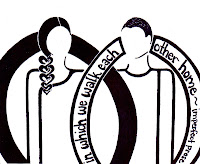Finally found a word for what I have been feeling
For the longest time I have been feeling so constricted and chained. Emotions have become unsettling and I have been trying to navigate them this way for the longest time now. Most often I sink into self-condemnation for the lack of understanding the rhythms of these emotions and why they drown me every so often. Reading Henri Nouwen has enlightened me because he finally finds a way to describe what I have been feeling. It's liberating and painful at the same time. It shows how much I am and have been wounded. It shows why I have been aching. And it shows why I have never felt interior freedom.
Resentment is a passion, a paralyzing set of complaints that make us feel angry and frustrated with the people and institutions on which we have made ourselves dependent. Passion, in the older sense of the word, is a suffering (pathos = suffering) and a frustration of the power to act rationally due to an overwhelming emotion. Sometimes this helplessness expresses itself in the form of undirected rage or random violence, but more often than not it finds its way onto the compulsive and constraining pathways of resentment. And although resentment is less frightening and less visible than the violent outburst of anger, it is no less destructive.
Each of us knows anger, and how anger is hot. Psychology tells us that if we get in touch with our angry feelings, name them and sometimes even lash out, the anger loses some of its power over us. We are encouraged to "work with" our anger, enter into our reasons for being upset, and try to engage with those who wound us. This deflating action prevents resentment from building a home in our hearts. But when we swallow our angry feelings and do not make them known, resentment settles in.
Resentment is cold, agonizing anger. When hot anger grows cold it hardens your heart and wreaks havoc in your life. Resentment makes you suspicious, cynical and depressed. Over the long term, resentment becomes a way of being.
Many of us live with cold anger--the deep feeling that life has let us down, that we suffer unjustly, and that nothing will be done about our complaints. Resentment is one of the most vicious qualities of life because it makes human relationships and community life so difficult. It prevents us from seeking forgiveness and robs us of our joy. It takes away our inner freedom to act creatively and makes us cling to negative feelings as our only way to find an identity. We then become what we are against the regress to the small satisfactions of unexpressed anger. It is from this passion that we must be freed in order to live a grateful and Eucharistic--that is, a thankful--life.
Resentment often is so deeply hidden that it is not even noticed by those who are most resentful. Resentful people always crave more attention to fuel their negative emotions and therefore, force others into a defensive stance. In so doing, they close themselves off, making it nearly impossible for others to touch their inner selves. Those of us who give our lives for loved ones, work hard, and have virtues that are praised sometimes are burdened by resentment in our hards. Resentment is the curse of the faithful, the virtuous, the obedient, and the hardworking.
Ministers who have a great desire to be close to God and serve the people, and those who work in the helping professions, are particularly prone to resentment. They often feel taken advantaged of, which can lead to resentment. Religious and social institutions that seek to support ministers and others in the helping professions often serve as breeding grounds for resentment. That is why resentment has been called the most destructive passion in the Catholic Church.


Comments
Post a Comment